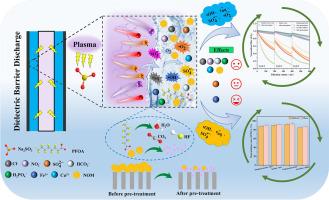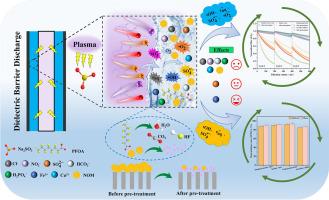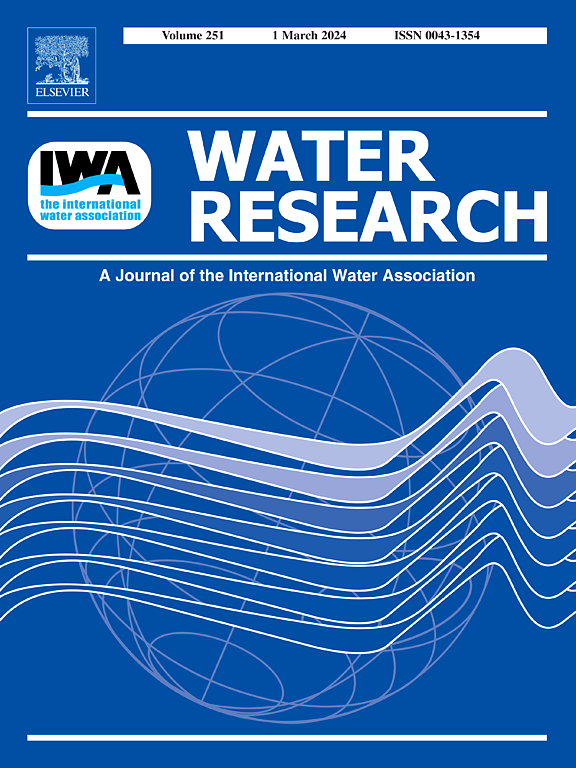通过介质阻挡放电/亚硫酸盐预处理提高超滤性能:水基质的影响和机理启示
IF 11.4
1区 环境科学与生态学
Q1 ENGINEERING, ENVIRONMENTAL
引用次数: 0
摘要
在多种实际水体中研究了利用介质阻挡放电(DBD)/亚硫酸盐超滤系统的可行性,旨在阐明长江水处理过程中在同步降解全氟辛酸(PFOA)的同时减轻膜堵塞的机理。结果表明,DBD/亚硫酸盐预处理具有显著的膜通量缓解率(84.10%)和全氟辛酸的高效降解率(85.13%),且随着pH值从3.0升至11.0而降低。阴离子、阳离子和天然有机物的存在会通过淬灭自由基而轻微阻碍膜堵塞的缓解和 PFOA 的降解;然而,SO42- 的添加影响微乎其微。各种自由基,包括羟基自由基(-OH)、硫酸根自由基(SO4--SO4--)、电子自由基(e-/eaq-e-/eaq-)、过氧化物阴离子自由基(-O2--O2-)和其他自由基(如 SO3--SO3--),在协同氧化还原效应中的贡献率分别为 33.25%、28.49%、20.56%、11.32% 和 6.39%。预处理通过在膜表面形成稀疏的污垢层,同时增加膜表面的粗糙度,有效减少了标准阻塞和滤饼过滤污垢机制。此外,在全氟辛烷磺酸降解过程中发挥重要作用的主要活性物种被确定为 SO4--SO4--、-OH 和 eaq-eaq-。这些物种在降解过程中的贡献率分别约为 43.63%、24.39% 和 20.65%。通过采用质谱法和密度泛函理论,建立了全氟辛烷磺酸的降解途径,有效降低了其降解副产物的毒性。这项研究为基于膜的水处理技术提供了创新性见解,可有效解决膜污垢缓解和 PFOA 降解问题。本文章由计算机程序翻译,如有差异,请以英文原文为准。


Improved ultrafiltration performance through dielectric barrier discharge/sulfite pretreatment: Effects of water matrices and mechanistic insights
The feasibility of utilizing a dielectric barrier discharge (DBD)/sulfite-ultrafiltration system was investigated in various real water bodies, aiming to clarify the mechanism behind alleviating membrane fouling while synchronously degrading perfluorooctanoic acid (PFOA) during the treatment process of Yangtze River water. The results demonstrated that the DBD/sulfite pretreatment exhibited remarkable rates of membrane flux mitigation (>84.10 %) and efficient degradation rates of PFOA (>85.13 %), which decreased with increasing pH from 3.0 to 11.0. The presence of anions, cations, and natural organic matter slightly hindered the membrane fouling mitigation and PFOA degradation by quenching free radicals; however, the addition of SO42− had a negligible impact. The mitigation of membrane fouling was attributed to the significant involvement of various radicals, including hydroxyl radical (•OH), sulfate radical (), electron (), su-peroxide anion radicals (), and other radicals such as , exhibiting respective contributions of 33.25 %, 28.49 %, 20.56 %, 11.32 %, and 6.39 % in a synergistic redox effect. The pretreatment effectively reduced standard blocking and cake filtration fouling mechanisms by creating a sparse fouling layer on the membrane surface while increasing its roughness. Additionally, the main active species that played a significant role in the degradation of PFOA were identified as , •OH, and . These species contributed approximately 43.63 %, 24.39 %, and 20.65 % respectively to the degradation process. By employing mass spectrometry and density functional theory, a proposed pathway for PFOA degradation was established, effectively reducing the toxicity associated with its degradation byproducts. This study provides innovative insights into membrane-based water treatment technologies that effectively tackle both membrane fouling mitigation and PFOA degradation.
求助全文
通过发布文献求助,成功后即可免费获取论文全文。
去求助
来源期刊

Water Research
环境科学-工程:环境
CiteScore
20.80
自引率
9.40%
发文量
1307
审稿时长
38 days
期刊介绍:
Water Research, along with its open access companion journal Water Research X, serves as a platform for publishing original research papers covering various aspects of the science and technology related to the anthropogenic water cycle, water quality, and its management worldwide. The audience targeted by the journal comprises biologists, chemical engineers, chemists, civil engineers, environmental engineers, limnologists, and microbiologists. The scope of the journal include:
•Treatment processes for water and wastewaters (municipal, agricultural, industrial, and on-site treatment), including resource recovery and residuals management;
•Urban hydrology including sewer systems, stormwater management, and green infrastructure;
•Drinking water treatment and distribution;
•Potable and non-potable water reuse;
•Sanitation, public health, and risk assessment;
•Anaerobic digestion, solid and hazardous waste management, including source characterization and the effects and control of leachates and gaseous emissions;
•Contaminants (chemical, microbial, anthropogenic particles such as nanoparticles or microplastics) and related water quality sensing, monitoring, fate, and assessment;
•Anthropogenic impacts on inland, tidal, coastal and urban waters, focusing on surface and ground waters, and point and non-point sources of pollution;
•Environmental restoration, linked to surface water, groundwater and groundwater remediation;
•Analysis of the interfaces between sediments and water, and between water and atmosphere, focusing specifically on anthropogenic impacts;
•Mathematical modelling, systems analysis, machine learning, and beneficial use of big data related to the anthropogenic water cycle;
•Socio-economic, policy, and regulations studies.
 求助内容:
求助内容: 应助结果提醒方式:
应助结果提醒方式:


